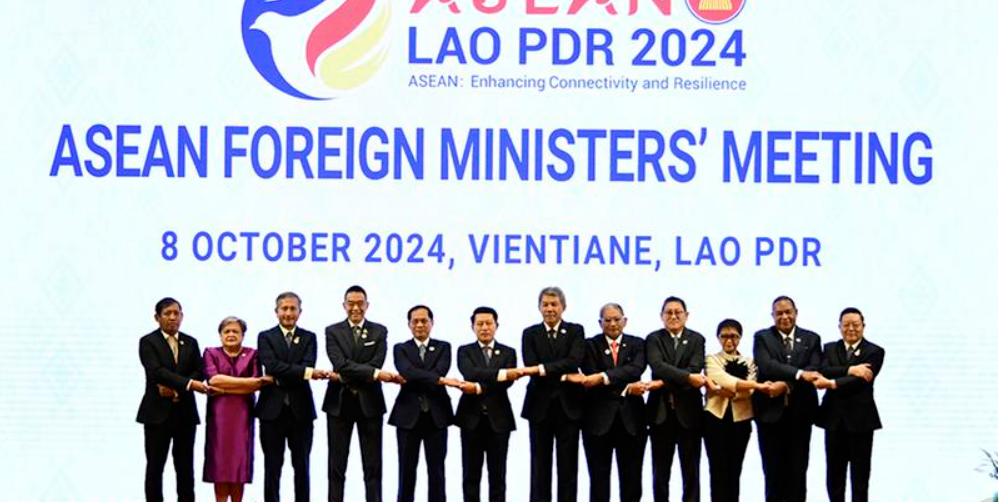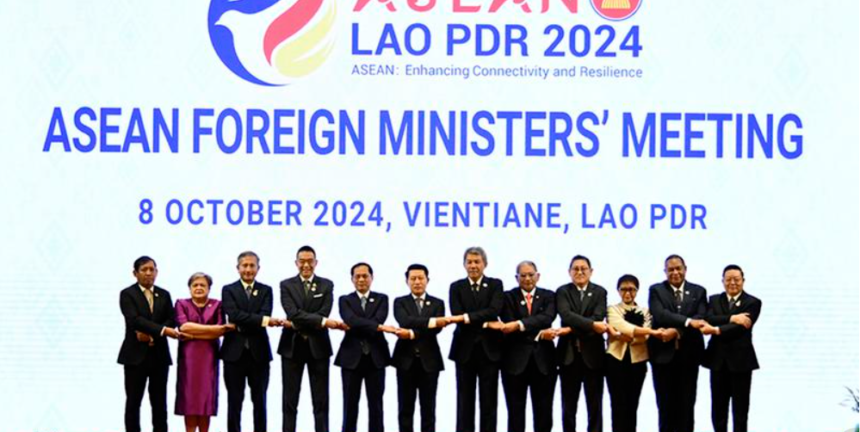Myanmar is set to send a representative to the Association of Southeast Asian Nations (ASEAN) for the first time in three years. This decision marks a pivotal shift in Myanmar’s relations with the regional bloc, as the country had been largely excluded from high-level ASEAN meetings following the military coup in 2021. The return of Myanmar’s representation in ASEAN comes at a time of immense political and social unrest within the country, as well as increasing pressure from regional and global players to address its internal issues.
This move has sparked significant interest across Southeast Asia and beyond, with analysts viewing it as a potential turning point for Myanmar’s involvement in regional diplomacy. But while this development brings new opportunities, it also raises critical questions about ASEAN’s role in resolving the crisis in Myanmar and the broader implications for regional cooperation. In this article, we will explore the background of Myanmar’s isolation, the reasons for its re-engagement, and the potential impacts on ASEAN and regional stability.
Background: Myanmar’s Exclusion from ASEAN
The exclusion of Myanmar from ASEAN meetings began in 2021, following the military coup that ousted the democratically elected government led by Aung San Suu Kyi. The coup resulted in widespread protests, a violent crackdown by the military, and ongoing political turmoil. International outrage followed, with many countries and international organizations, including ASEAN, condemning the junta’s actions.
ASEAN, known for its policy of non-interference in the internal affairs of member states, faced a major dilemma. On the one hand, the bloc has traditionally refrained from interfering in domestic politics; on the other hand, the severity of the situation in Myanmar made it impossible to ignore. As a result, ASEAN took an unprecedented step by excluding Myanmar’s military leadership from high-level meetings, while still calling for a peaceful resolution through dialogue.
The ASEAN-led “Five-Point Consensus,” agreed upon in April 2021, called for an immediate cessation of violence, dialogue among all parties, and the delivery of humanitarian assistance. However, the military junta showed little interest in implementing these points, and Myanmar’s exclusion from the ASEAN summit continued. The ongoing violence, coupled with the lack of any real progress towards peace, kept Myanmar isolated from regional decision-making processes.
Why Is Myanmar Returning Now?
After three years of being excluded from ASEAN meetings, Myanmar’s decision to send a representative marks a significant change. There are several reasons why Myanmar may be returning to the diplomatic table now, and understanding these factors is essential to interpreting the broader regional dynamics.
1. Diplomatic Pressure and Regional Stability Concerns
Myanmar’s internal crisis has had significant spillover effects on its neighbors, including an influx of refugees, the destabilization of border areas, and concerns over the spread of violence. Countries like Thailand, China, and India, which share borders with Myanmar, have a vested interest in stabilizing the situation to avoid further disruption. These countries, particularly China, which has been involved in multiple infrastructure and investment projects in Myanmar through its Belt and Road Initiative, may have exerted pressure on Myanmar to re-engage with ASEAN.
Additionally, Myanmar’s return to ASEAN provides an opportunity for the regional bloc to address issues of instability that could have broader consequences for Southeast Asia. The internal conflict in Myanmar has the potential to disrupt regional trade routes and create security threats, including cross-border crime and increased military tensions. ASEAN, as the primary regional forum for cooperation, cannot afford to have one of its members remain isolated indefinitely.
2. Myanmar’s Economic Needs
Myanmar’s economy has been severely affected by the political crisis, with Western sanctions, a decrease in foreign investment, and disrupted trade taking their toll. Re-entering ASEAN provides Myanmar with an opportunity to restore some level of economic engagement with its neighbors and, potentially, reduce the impact of international isolation. As a member of ASEAN, Myanmar benefits from trade agreements and economic cooperation within the region, which could be vital for the country’s economic recovery.
Myanmar may also view its return to ASEAN as a way to attract more investment and rebuild diplomatic ties. By re-engaging with ASEAN, Myanmar could signal to potential investors that it is ready to stabilize its economy and open up to regional trade once again.
3. ASEAN’s Changing Leadership
The internal dynamics within ASEAN itself may have contributed to Myanmar’s return. Indonesia, which has been the chair of ASEAN in 2024, has taken a more proactive stance in dealing with Myanmar’s crisis. Indonesian President Joko Widodo has emphasized the importance of dialogue and finding a peaceful solution, urging Myanmar to respect the Five-Point Consensus. Under Indonesia’s leadership, ASEAN has sought to re-establish a diplomatic channel with Myanmar to prevent further escalation of violence.
Other ASEAN members, such as Thailand and Cambodia, have also shown a willingness to engage with Myanmar, emphasizing the need for unity within the bloc. These countries have historically taken a more lenient stance toward Myanmar’s military government, and they may have played a role in encouraging Myanmar to send a representative.
The Potential Impact of Myanmar’s Return on ASEAN
Myanmar’s return to ASEAN meetings brings both opportunities and challenges for the regional bloc. On the one hand, re-engaging with Myanmar could help restore ASEAN’s reputation as a united, inclusive organization. On the other hand, the ongoing crisis in Myanmar poses significant risks to credibility and effectiveness.
1. Strengthening ASEAN Unity
The return of Myanmar to meetings could strengthen the bloc’s unity, as it allows for all ten member states to participate in regional discussions. which prides itself on its ability to foster cooperation among diverse countries, this is a positive step toward restoring internal cohesion. Having Myanmar back at the table could also help address regional challenges more effectively, such as economic recovery from the COVID-19 pandemic, security threats, and cross-border trade issues.
2. Impact on ASEAN’s Credibility
However, there are concerns that Myanmar’s return could damage credibility on the global stage. The international community, particularly Western nations, has been critical of ASEAN’s perceived inability to address the Myanmar crisis. If Myanmar is allowed to rejoin without making any meaningful progress on the Five-Point Consensus or halting the violence, ASEAN may be seen as ineffective in resolving regional conflicts.
Myanmar has already faced criticism from human rights organizations and opposition groups within Myanmar, who argue that the bloc has been too lenient on the military junta. Allowing Myanmar to participate in high-level meetings without addressing these concerns could weaken standing as a mediator in regional crises. 
3. Humanitarian Concerns and ASEAN’s Non-Interference Policy
One of the biggest challenges facing reintegrates Myanmar is balancing the bloc’s traditional policy of non-interference with the need to address the ongoing humanitarian crisis. The principle of non-interference has been a cornerstone of ASEAN since its founding, but the situation in Myanmar has tested this policy to its limits.
As Myanmar returns , the bloc will need to find a way to address the humanitarian concerns raised by the conflict without overstepping its traditional boundaries. This is a delicate balancing act that will require careful diplomacy and continued engagement with all parties involved in Myanmar’s political crisis.
What Lies Ahead: Challenges and Opportunities
As Myanmar re-engages both the country and the regional bloc face significant challenges. For Myanmar, the key challenge will be demonstrating a genuine commitment to resolving its internal conflict and working toward a more peaceful future. This will require the military government to engage in meaningful dialogue with opposition groups, respect human rights, and restore democratic processes.
the challenge lies in maintaining its credibility while balancing the interests of all its member states. The bloc will need to continue pressing Myanmar to implement the Five-Point Consensus while also ensuring that it remains a unified and inclusive organization. A Myanmar crisis effectively will have far-reaching implications for its role in regional diplomacy and conflict resolution.
Despite these challenges, Myanmar’s return to presents opportunities. By re-engaging with the regional bloc, Myanmar has a chance to rebuild its diplomatic and economic relationships with its neighbors. in turn, has an opportunity to strengthen its role as a mediator and facilitator of peace in the region.
Conclusion
Myanmar’s decision to send a representative to after three years of isolation marks a critical moment in regional diplomacy. While this move offers new opportunities for dialogue and cooperation, it also presents significant challenges for both Myanmar and ASEAN. As the region moves forward, the focus will be on finding a sustainable solution to the ongoing crisis in Myanmar, while maintaining ASEAN’s unity and credibility as a regional organization. With careful diplomacy and a commitment to peace, it can play a key role in shaping Myanmar’s future and ensuring stability in Southeast Asia. ALSO READ:-BJP Retains Haryana with a Third Straight Win; Congress Suffers a Jolt 2024





